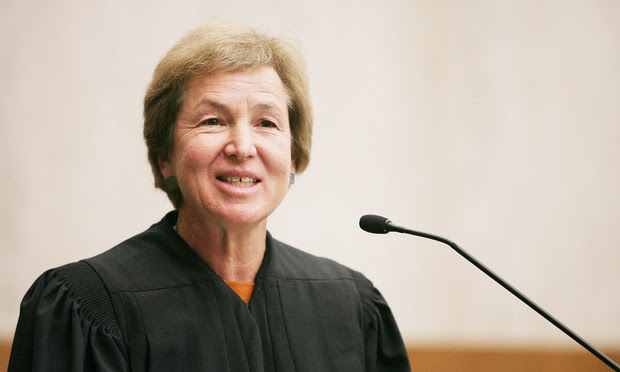Critical Mass: Remington Bankruptcy Could Delay Sandy Hook Suit. Plus, Ex-Students Take Shuttered Law School to Court
Remington Outdoor's Chapter 11 bankruptcy could hold up a case brought by 10 families of victims of the 2012 shooting at Sandy Hook Elementary School, even if the Connecticut Supreme Court rules in their favor.
March 27, 2018 at 02:00 PM
7 minute read
Welcome to Critical Mass, Law.com's briefing on class actions and mass torts. I'm Amanda Bronstad in Los Angeles. A casualty of Remington's Chapter 11 bankruptcy could be the case brought by 10 families of Sandy Hook victims that's now before the Connecticut Supreme Court. After Savannah Law School closed its doors, former students did as they've been taught: they sued. And a federal judge in a class action questioned what PACER fees actually fund.
Send your feedback to [email protected], or find me on Twitter: @abronstadlaw.
Would you like to receive Critical Mass as an email? Sign up here.
Remington's Bankruptcy Could Silence Sandy Hook Victims
Remington's Chapter 11 bankruptcy could hold up a case brought by 10 families of victims of the 2012 shooting at Sandy Hook Elementary School, even if the Connecticut Supreme Court rules in their favor. That's according to this story by Law.com's Robert Storace.
The bankruptcy: According to Bloomberg's story (see here), Remington cited a slowdown in gun sales following President Donald Trump's election as a reason for its bankruptcy filing. It also noted a failed IPO and investor revolt following Sandy Hook.
The Sandy Hook case: Adam Lanza killed 26 people at Sandy Hook with an AR-15, a semi-automatic rifle that's been used in several mass shootings including last month's massacre of 17 persons at Marjory Stoneman Douglas High School in Parkland, Florida. Families of the Sandy Hook victims sued Remington, the manufacturer of the weapon, which was used by Lanza after it had been sold to his mother. But the shooting victims' families have faced an uphill battle in court. The Connecticut Supreme Court heard oral arguments in the case last November (see here).
Now, even if the plaintiffs win at the high court, Remington's bankruptcy could mean a long waiting period.
“The takeaway is that even if the case is remanded back to the lower court by the state's high court, the bankruptcy court in Delaware could – potentially – hold things up for awhile,” Robert told me.
That's not Remington's only legal problem. In 2014, Remington settled a nationwide class action brought by its customers over allegedly defective rifles. On Monday, Remington lawyer John Sherk of Shook, Hardy & Bacon filed a notice before the 8th Circuit, which heard oral arguments last month (see here) in a highly publicized appeal of the settlement, that the case could be stayed given the bankruptcy.
Ex-Students Take Savannah Law School to Court
Former law students of the shuttered Savannah Law School have filed a class action over the abrupt closure, claiming the school misled them about its financial stability and devalued their grades, according to Law.com's story by Katheryn Tucker (see here).
Just last week, school officials announced that Savannah Law School would close its doors at the end of the spring semester (see this story by Law.com's Karen Sloan). The law school, which had been operated as a Savannah campus of Atlanta's John Marshall Law School, cited small enrollment numbers.
It's the latest law school to close amid low bar passage rates and a tight job market. School officials sold the building and offered one-time $2,000 scholarships for students to transfer to its main site in Atlanta.
Stephen Lowry of Harris Lowry Manton filed the case on behalf of the students.
Judge Asks: What Do PACER Fees Actually Fund?
A federal judge is weighing whether to toss a class action brought over PACER fees. Law.com's Cogan Schneier has this story. At a Friday hearing on summary judgment arguments, U.S. District Judge Ellen Huvelle in Washington D.C. appeared skeptical of both sides, asking how much the fees charged to the public fund other programs like the Case Management/Electronic Case Files (CM/ECF) system, e-juror services and victim notification under the Violent Crime Control Act.
Gupta Wessler's Jonathan Taylor argued for the plaintiffs, while AUSA Brian Field represented the government.
Cogan, who went to the hearing, told me:
“The judge seemed less convinced about the other things besides CM/ECF. So it may be possible that we get a ruling that says, listen, it's okay to use the fees to fund CM/ECF, but to the extent you're charging PACER users for these other services they don't use, that might not be okay.”
Who Got the Work?
Tucker Ellis appeared this month as lead counsel to University Hospitals Ahuja Medical Center in Beachwood, Ohio, which faces at least 13 lawsuits over a freezer malfunction earlier this month at its fertility clinic that potentially left 2,000 eggs and embryos not viable (a separate class action was filed on March 13 over a similar event that occurred at San Francisco's Pacific Fertility Clinic).
On March 15 and March 19, three Tucker Ellis attorneys appeared in the Ohio cases: Cleveland partners Robert Tucker, Edward Taber, and Rita Maimbourg, chairwoman of the firm's trial department. They filed motions to stay the cases pending consolidation, which plaintiffs lawyers have opposed. The cases, filed in Cuyahoga County Court of Common Pleas, had a status conference on Monday.
Here's what else you need to know today:
➤ Asbestos Abating: Asbestos filings fell in 2017, according to a report by defense consulting firm KCIC. Here's my story on the report, which found there were 4,450 asbestos filings last year, compared to 4,812 in 2016–and the decline in filing did not depend on whether the claim centered on mesothelioma, lung cancer or other cancers. The report also highlighted the top 10 plaintiffs' firms, which filed 62% of all asbestos cases last year. No. 1 was Gori Julian & Associates, which filed 588 asbestos cases last year, up 8.1% from 2016. Other firms included Weitz & Luxenberg; Goldberg, Persky & White; Simmons Hanly Conroy, and Napoli Shkolnik.
➤ Tempered Testosterone Verdict: For a verdict, $3.2 million isn't too shabby — but maybe not when the original verdict was $150 million. On Monday, a federal jury in Illinois awarded $3.2 million to an Oregon man who claimed his use of AndroGel to treat low testosterone levels caused him to suffer a heart attack. According to my story (see here), the same plaintiff won $150 million last year, but a federal judge overseeing all the “low-T” multidistrict litigation vacated the award and set the case for a retrial, which began earlier this month. A spokeswoman for AbbVie, the defendant in the trial along with Abbott Laboratories, said it would appeal.
➤ What's in a name?: As tax season approaches, here's something to think about should you decide to write that big check to your alma mater: A former Kline & Specter attorney lost his bid to remove the arbitrator in his long-running fee dispute with his former firm based on the name of a law school. Here's Law.com's story.
Donald Haviland, who managed the Philadelphia firm's class action practice more than 10 years ago, sought to disqualify retired Judge Mark Bernstein because he teaches at the Thomas R. Kline School of Law at Drexel University. But Pennsylvania Superior Court Judge Mary Murray found no conflict: “Bernstein maintained that he has taught at the law school since long before it was renamed the Thomas R. Kline School of Law and that Kline has no involvement with his teaching at the school,” she wrote.
This content has been archived. It is available through our partners, LexisNexis® and Bloomberg Law.
To view this content, please continue to their sites.
Not a Lexis Subscriber?
Subscribe Now
Not a Bloomberg Law Subscriber?
Subscribe Now
NOT FOR REPRINT
© 2025 ALM Global, LLC, All Rights Reserved. Request academic re-use from www.copyright.com. All other uses, submit a request to [email protected]. For more information visit Asset & Logo Licensing.
You Might Like
View All
Global Lawyer: Big Law Walks a Tightrope But Herbert Smith Freehills Refuses to Lose Its Footing
8 minute readTrending Stories
Who Got The Work
J. Brugh Lower of Gibbons has entered an appearance for industrial equipment supplier Devco Corporation in a pending trademark infringement lawsuit. The suit, accusing the defendant of selling knock-off Graco products, was filed Dec. 18 in New Jersey District Court by Rivkin Radler on behalf of Graco Inc. and Graco Minnesota. The case, assigned to U.S. District Judge Zahid N. Quraishi, is 3:24-cv-11294, Graco Inc. et al v. Devco Corporation.
Who Got The Work
Rebecca Maller-Stein and Kent A. Yalowitz of Arnold & Porter Kaye Scholer have entered their appearances for Hanaco Venture Capital and its executives, Lior Prosor and David Frankel, in a pending securities lawsuit. The action, filed on Dec. 24 in New York Southern District Court by Zell, Aron & Co. on behalf of Goldeneye Advisors, accuses the defendants of negligently and fraudulently managing the plaintiff's $1 million investment. The case, assigned to U.S. District Judge Vernon S. Broderick, is 1:24-cv-09918, Goldeneye Advisors, LLC v. Hanaco Venture Capital, Ltd. et al.
Who Got The Work
Attorneys from A&O Shearman has stepped in as defense counsel for Toronto-Dominion Bank and other defendants in a pending securities class action. The suit, filed Dec. 11 in New York Southern District Court by Bleichmar Fonti & Auld, accuses the defendants of concealing the bank's 'pervasive' deficiencies in regards to its compliance with the Bank Secrecy Act and the quality of its anti-money laundering controls. The case, assigned to U.S. District Judge Arun Subramanian, is 1:24-cv-09445, Gonzalez v. The Toronto-Dominion Bank et al.
Who Got The Work
Crown Castle International, a Pennsylvania company providing shared communications infrastructure, has turned to Luke D. Wolf of Gordon Rees Scully Mansukhani to fend off a pending breach-of-contract lawsuit. The court action, filed Nov. 25 in Michigan Eastern District Court by Hooper Hathaway PC on behalf of The Town Residences LLC, accuses Crown Castle of failing to transfer approximately $30,000 in utility payments from T-Mobile in breach of a roof-top lease and assignment agreement. The case, assigned to U.S. District Judge Susan K. Declercq, is 2:24-cv-13131, The Town Residences LLC v. T-Mobile US, Inc. et al.
Who Got The Work
Wilfred P. Coronato and Daniel M. Schwartz of McCarter & English have stepped in as defense counsel to Electrolux Home Products Inc. in a pending product liability lawsuit. The court action, filed Nov. 26 in New York Eastern District Court by Poulos Lopiccolo PC and Nagel Rice LLP on behalf of David Stern, alleges that the defendant's refrigerators’ drawers and shelving repeatedly break and fall apart within months after purchase. The case, assigned to U.S. District Judge Joan M. Azrack, is 2:24-cv-08204, Stern v. Electrolux Home Products, Inc.
Featured Firms
Law Offices of Gary Martin Hays & Associates, P.C.
(470) 294-1674
Law Offices of Mark E. Salomone
(857) 444-6468
Smith & Hassler
(713) 739-1250














